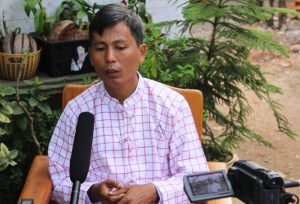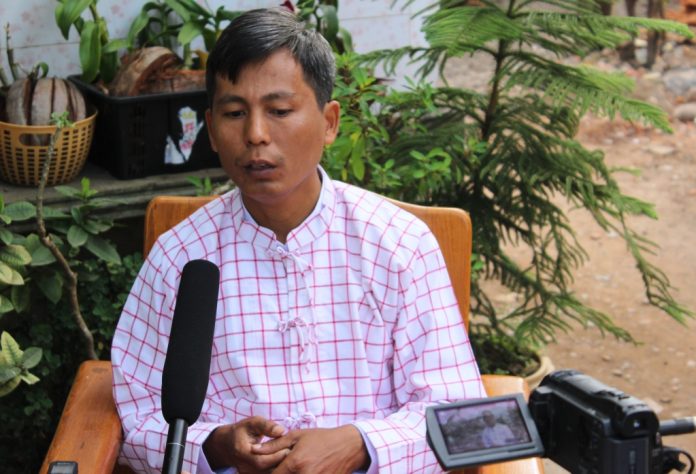Dr. Aung Naing Oo, a member of the All Mon Region Democracy Party (AMDP), was re-elected to his second term in the State Hluttaw (Parliament) in last year’s 
political developments in Mon State and changes to expect under the new government.
Born in Mon State’s Mudoon Village in Chaungzone Township, Dr. Aung Naing Oo contested and won a parliamentary seat in his native township in the 2010 elections. Then, he was re-elected for the State Hluttaw, in 2015.
Mon News Agency (MNA): As a re-elected representative, how will you carry out your responsibility under this new government?
Dr. Aung Naing Oo: First, there is a lot of work remaining to be done during this concluding 5-year term. Secondly, we have to consider that the [state-level] Hluttaw needs to be improved. Before, many people did not know that there even was a Hluttaw in [Mon] state.
One issue is that the government has not yet accepted much serious input from the State Hluttaw. It seems like the Hluttaw is not very powerful and does not have much ability to work on behalf of the people. Democratically, the parliament should be at the center. The [state] government also has to be responsible to the Hluttaw. The people should be better connected with the Hluttaw, too.
MNA: You say many people don’t know that we have a State Hluttaw, could you please explain why that is?
Dr. Aung Naing Oo: After the first Hluttaw session was held [in 2011], it had little authority to monitor or collaborate with the [state] government. This is the check and balance part. There was a time when the government carried out its work in accordance with the law, but it is the Hluttaw’s responsibility to keep an eye on how or what the government does. The Hluttaw’s responsibility even starts from evaluating how the government spends the budget, and whether what it does is right. But, in the last five years, the Hluttaw did not have much authority and was weak in doing so. Although there is a parliament, it does not have much power, and the government side did not want to listen.
MNA: What strategies do you have in mind to address these issues during the second Hluttaw term under a new government?
Dr. Aung Naing Oo: One of the Hluttaw’s weaknesses is that it has a shortage of human resources. The State Hluttaw only has 31 members comprised of 23 elected [civilian] members and 8 members appointed from the army. So, the Hluttaw has inadequate capacity to monitor the government. The elected [civilian] members must also be qualified, so it may be difficult for members to be brave enough to criticize and speak out. For parliament’s [second five-year term], we must improve the capacity of the Hluttaw representatives. Opportunities like meeting parliamentary representatives from other countries can help us improve.
MNA: It has been announced that the Amyotha Hluttaw and Pyithu Hluttaw (Upper and Lower Houses of Parliament) will convene a new session on February 1. So around that date, the State Hluttaw also will hold a new session, can you explain how the state session will take place, how the responsibility will be appointed, and how authority is to be transferred to the new government?
Dr. Aung Naing Oo: The timeframes for the changes to the Hluttaw and government seats are not the same. According to the constitution, the terms for union government and state government officials end on January 31. When the new Hluttaw session begins, the government terms will not yet be finished. At the State Hluttaw session, the chairman and vice-chairman will be chosen, and at the union [Pyidaungsu] Hluttaw, the chairmanship positions will be elected. Then the board to elect the president will be formed. Only after the president is appointed will the state and region ministers be appointed. At that point, we will have ministers in our state. From February 1 to March 31, the Hluttaw will elect members for the government and then appoint respective places.
MNA: What kinds of plans do you personally want the Mon State government to pursue?
Dr. Aung Naing Oo: In the 2015 election, the National League for Democracy (NLD) won by a landslide so the appointment of the chief minister and the ministers depends on them. For us, we would like to have good people elected for these positions, those who are qualified. And, in forming the government, representatives from the Mon parties should be given priority in leading and decision-making for the rights of Mon people. This is how the majority of the ethnic parties would like to be formed, too. But, I do not know yet the NLD’s level of understanding for the ethnic political parties. We want to suggest that it would be best if the NLD gives priority to the leaders of ethnic political parties.
MNA: Regarding the State Ministry, what adjustments would you like to see to the arrangement and responsibilities of the departments?
Dr. Aung Naing Oo: It all depends on the President regarding how to appoint the departments and how many departments there will be, and what activities are [assigned to] union-level or state-level departments. The president has complete authority. During the last term, the president appointed 35 departments for the union-level and 9 departments for our state. I am not sure whether this new government will do the same. This depends on the president or the NLD government, since it won the election. According to the 2008 Constitution, there should be at least 8 departments at the state level.
Regardless of the number of departments, the mandates of each should be transparent. During the U Thein Sein administration, some departments had clear orders but others did not. For example, some road projects fell under the Department of Road Transportation Administration [Ministry] while some were under the Ministry of Construction. I understand that the administration projects are divided into union-level and state-level, but this can be confusing. It also means that at some points, ministers have authority or influence over a project even if it is not directly under their department. It is up to the president, but I would like this to be more transparent this time.
MNA: Do you personally prefer to work for the Hluttaw or the state government?
Dr. Aung Naing Oo: For me, I prefer to work for the Hluttaw. If you know how to work within the parliament, there are a lot of benefits. If we carry out our work democratically, the Hluttaw can be strong. If the Hluttaw is not strong, it won’t be democratic but authoritarian. Almost all Hluttaw members are interested in ministerial posts. To tell the truth, they would receive higher salaries [as a minister], could enjoy a higher standard of living, and people would look up to them more. For me, I enjoy working with the Hluttaw. I am not saying that the [state] government work is not good – if you know how to accomplish government work, it has enormous impact. Although I am interested in working at the Hluttaw, I will continue working for the state government if that is what is needed. Whatever position I am appointed to, I would carry out my responsibility until accomplished.
MNA: What is your opinion about unification among the Mon people and development in Mon State?
Dr. Aung Naing Oo: The Mon [people] are not happy with the election results because Mon [party] representatives lost the majority of the [seats they contested] in the 2015 elections. That’s because we were not united. It is true that among many Mon people who are working in the public sector, there is no unity. Now, everyone is aware of the fact that we have to prepare for the 2020 elections. We already have agreements. Yet some people are still placing blame for the election losses [last year]. We are holding a monthly meeting to negotiate political unity. But many people still do not believe that the unification of the three [Mon political] parties will be accomplished. We still have different thoughts on how to approach the merging of the parties.
I want to add that now the youth organizations have become very important. We do not want the youth organizations to also become divided, like the leaders and political parties. At the moment, we should not yet think about this or that party but we should think about how all of us can join together as we move forward. Parties also should not criticize one another. This is the same thing for the leaders; they should not look down on each other. Now, we all should understand each other. The deadline for the parties’ unification should be 2017, and I would like to urge everyone to help bring the parties together.
MNA: Is there anything you would like to add?
Dr. Aung Naing Oo: In politics, there is always work to be done; there is no idea of, “the work is completed and so now we are finished.” Our leaders have worked hard, as much as they could. Now, it is our time to deliver, and then we later hand it over to the young generation. So I want to urge that we focus and have understanding and help work toward the long-term goals. The media, civil society, and other non-government organizations should lend a hand to achieve prosperity in our people’s future.

